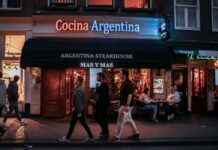Since the beginning of May, the Chinese capital, populated by 22 million people, had closed bars, cafes, sports halls, gymnasiums, museums, or even dozens of metro stations in order to face an epidemic outbreak.
«I was looking forward to being there, especially because I couldn’t go out for so long,» a smiling Chen Chunmei told AFP.
«Every day, I ordered food or I cooked. So I really wanted to have a restaurant.»
Only a few dozen new daily cases were recorded in Beijing, but like elsewhere in China, the municipality applied a zero Covid strategy in order to prevent the spread of the virus and deaths.
Residents were forced for several weeks to perform a PCR test at least every 48 hours, buildings were confined and people were placed in quarantine.
– «Really boring» –
Chen Chunmei explains that his residential complex was placed under confinement for two weeks, after the detection of a positive case. But after these 15 days, it was his metro station which in turn closed.
«Since then, I’ve been staying at home,» she explains.
«At first, I liked working at home. But after a while, it becomes really boring.»
With the number of new positive cases in Beijing gradually falling (only two announced on Tuesday), authorities are now allowing residents to return to the office. Schools will be able to reopen gradually from June 13.
The Universal Studios amusement park has announced its reopening for June 15.
Cinemas and gyms have also reopened – at 75% capacity for now.
Eating in restaurants is therefore possible again, except in two Beijing districts which continue to apply restrictions due to the discovery of positive cases.
– PCR tests maintained –
If the anti-Covid measures have made it possible to limit deaths from the coronavirus, they have obviously led to economic losses for restaurateurs.
«Our turnover in May fell about 65% compared to last year,» laments Zhang Shengtao, director of operations at Beijing Huda Catering, which runs a popular chain of crawfish restaurants in Beijing. garlic and chillies.
“I was impatiently awaiting the recovery,” breathes Wu Ziwen, the manager of a restaurant Nanjing Dapaidang, another chain which offers specialties from eastern China.
«Of course we lost money» during the past month, even if home deliveries helped to cushion the shock a little, he explains to AFP.
However, the recovery is not yet complete. Establishments can only operate at 50% capacity “even if customers are pouring in,” Wu said.
Pekingese must also have a negative PCR test that is less than 72 hours old in order to enter most buildings and use public transportation.











